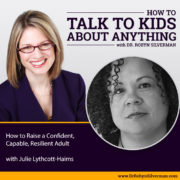How to Raise a Confident, Capable, Resilient Adult with Julie Lythcott-Haims
In her 2016 Ted Talk, Julie Lythcott-Haims started off by saying, “there’s a certain style of parenting these days that is kind of messing up kids, impeding their chances to develop into themselves. There’s a certain style of parenting these days that’s getting in the way. I guess what I’m saying is, we spend a lot of time being very concerned about parents who aren’t involved enough in the lives of their kids and their education or their upbringing, and rightly so. But at the other end of the spectrum, there’s a lot of harm going on there as well, where parenting feel a kid can’t be successful unless the parent is protecting and preventing at every turn and hovering over every happening and micromanaging every moment, and steering their kid towards some small subset of colleges and careers….our kids end up leading a kind of check-listed childhood, she goes on to say, such that, she warns that once they end up at the end of high school they are breathless—of course—they have spent so much time having been obsessed with grades and activities—becoming what they are supposed to be rather than exploring who they may want to become. What interests them. And knowing, with their own brains and experimenting with their own grit and their own skills—to develop into a self-sufficient, resilient adult. So it begs the question—what can we do to break free from the overparenting trap that says we must be on our children every minute prodding and directing, being our child’s concierge, as Julie Lythcott-Haims labels, and instead, preparing our children to become successful adults who can stand on their own two feet.

